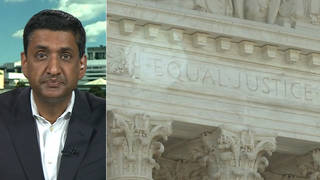
The Supreme Court has struck down President Biden’s plan to provide relief to 40 million student borrowers of up to $20,000 in student loan debt. We speak to David Dayen, executive editor of The American Prospect, about how one of the key complainant states, Missouri, hinged its opposition on the argument that its state agency, the Missouri Higher Education Loan Authority, or MOHELA, will be harmed by the debt relief plan. However, Dayen reports, MOHELA is a “complete unwilling participant” in the case.
Transcript
AMY GOODMAN: We’re going to end today’s show looking at the other decision the Supreme Court is issuing today, to decide the fate of President Biden’s student debt relief plan. We’re joined by David Dayen, executive director — executive editor of The American Prospect, where he has a piece headlined “The Student Loan Case’s Unwilling Participant.”
David, coming out of what we just heard with Melissa around the gay — the fake gay marriage website, talk about what you found in this other Supreme Court case.
DAVID DAYEN: Yeah, it’s a remarkable amount of similarity here, really. So, in the student loan case, the key issue is standing: Is someone injured by the fact that people are getting this debt relief from the government on their student loans? And the state of Missouri, along with several other states, brought this lawsuit, and they claim that because there’s a thing called the Missouri Higher Education Loan Authority, which is a servicer — they do the day-to-day operations on the loans — that because they will be harmed, allegedly — actually, they won’t be harmed — but because they will allegedly be harmed by losing a number of student loans to service, then because they owe the state of Missouri money, they might not be able to pay it back. And there are just enormous amounts of reasons why this is problematic.
First of all, the loan fund that allegedly the Missouri Higher Education Loan Authority won’t be able to pay back to the state of Missouri, they haven’t made a payment on it in the last 15 years, and internal documents show that they have no intention of paying into this fund.
The second thing is, internal emails have shown that the Missouri Higher Education Loan Authority had nothing to do with this case — didn’t file it, didn’t solicit it, didn’t know it was happening and didn’t know they were being used as a substitute for standing for the state of Missouri, until they read about it in news reports. And there are internal emails between employees of MOHELA saying, “We were opposed to this move, but we couldn’t do anything about it. The Missouri state attorney general needed to claim that our borrowers were harmed so that they could have standing in the case.”
So, you know, a real similarity of — we talk about the Supreme Court’s corruption in terms of, you know, going on junkets and things like this, but, I mean, maybe a deeper corruption is the fact that they seem to not check the basic facts in these various cases, and they’re ruling on things that aren’t legitimate in some way.
AMY GOODMAN: How are these not being fact-checked?
DAVID DAYEN: I mean, it really — once it gets —
AMY GOODMAN: Talk about how you found it.
DAVID DAYEN: Once it gets —
AMY GOODMAN: Talk about how you found it.
DAVID DAYEN: Well, it was through state sunshine laws. The Missouri Higher Education Loan Authority is sort of a —
AMY GOODMAN: It’s called MOHELA?
DAVID DAYEN: MOHELA is sort of a state instrumentality. And they — in fact, the only way that the state of Missouri could get information from MOHELA is that they had to use state sunshine laws to extract that information. And so, advocates at the Student Borrower Protection Center did the same thing, looking up whether they were talking about this case, and they found this tranche of emails that shows that they had nothing to do about it. And in one case, one employee asked, you know, “Are we involved in this case? Are we the bad guys?” is the direct quote that the MOHELA employee makes.
So, yeah, I mean, it’s a situation where by the time it gets to the Supreme Court, they sort of assume facts, as Melissa said. They assume the facts as legitimate. But in this case, you know, if the court in fact rules to deny 43 million borrowers reductions in their loan balances, they’ll be doing it based on a standing argument on behalf of a plaintiff that was a complete unwilling participant in this case.
AMY GOODMAN: And if the court does rule that way, can President Biden still cancel student debt?
DAVID DAYEN: A lot of advocacy groups say that the president could use other means. Right now they are using the authority granted under something called the HEROES Act, which allows them in the cases of emergency like the pandemic to ensure that borrowers aren’t made worse by those — that situation. They could also use the 1965 Higher Education Act and its compromise and settlement authority to reduce loan balances. It certainly remains to be seen, if the Supreme Court sort of slaps down the president, whether he would be willing to use another authority to try to do it in a different way.













Media Options